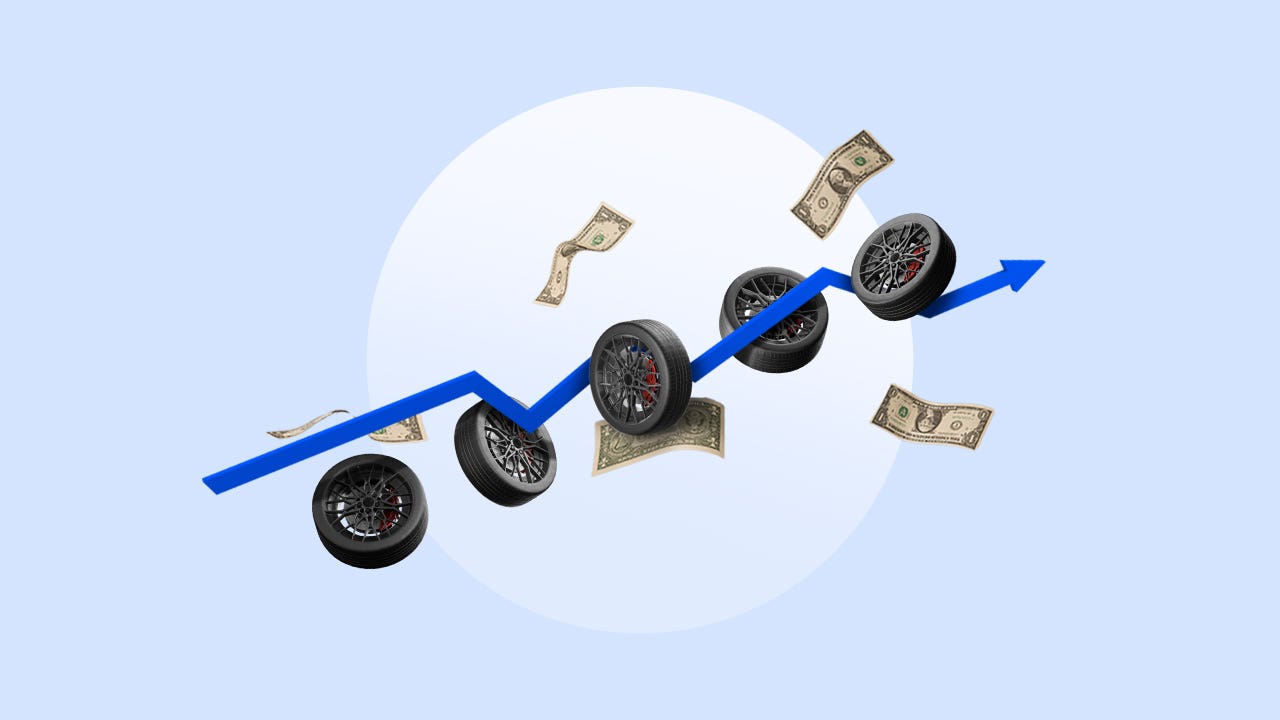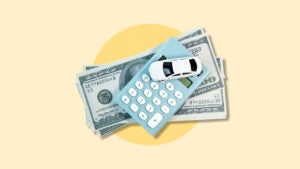Average auto loan interest rates by credit score in 2025

Key takeaways
- New car loans had an average interest rate under 7%, while used car loan rates averaged nearly just under 11.50% in the third quarter of 2025.
- Your credit score plays a significant role in determining your interest rate, but other factors such as the lender, amount borrowed, length of the loan and economic conditions also play a role.
- The best way to secure a competitive interest rate on your auto loan is to shop around and work to improve your credit score.
The average auto loan interest rate for new cars in the third quarter of 2025 was 6.56%, while the average used car loan interest rate was 11.40%, according to Experian’s State of the Automotive Finance Market report.
Typically, a lower credit score will lead to a higher annual percentage rate (APR), and a higher APR will increase the cost of your car by hundreds of dollars. You don’t need a perfect credit score to get a reasonable rate, though. You can save on your loan by shopping around for the best auto loan rates and improving your credit score.
Average auto loan interest rates by credit score
Borrowers with the highest scores receive the lowest rates, but it’s possible to get a good rate without a perfect score. Lenders consider several factors when determining interest rates, including your credit score. By improving your score for a car loan, you can save money by qualifying you for a better rate. There isn’t a significant difference between a superprime borrower and a prime borrower, but rates increase significantly if you fall outside of the prime range.
| Credit score | New car loans | Used car loans |
|---|---|---|
| 781 to 850 (super prime) | 4.88% | 7.43% |
| 661 to 780 (prime) | 6.51% | 9.65% |
| 601 to 660 (near prime) | 9.77% | 14.11% |
| 501 to 600 (subprime) | 13.34% | 19.00% |
| 300 to 500 (deep subprime) | 15.85% | 21.60% |
Average used car interest rates by state
Where you live also impacts the rate you receive. For new cars, drivers in Minnesota and South Dakota had average rates under 6%, while those in Alabama, Georgia and New Mexico saw average rates above 8%. For used cars, drivers in the south faced average rates around 12%, while those in Utah and Washington had the lowest rates just under 9%.
Why does the interest rate matter on a car loan?
Interest is the price you pay each month to borrow money. The higher your interest rate, the more you pay overall for your loan. Even reducing your interest rate by a fraction of a percentage point can save you hundreds of dollars.
For example, we calculated the cost of a car loan with a $30,000 balance and a term of 60 months. A borrower with excellent credit will pay around $160 less per month than a borrower with poor credit — and may end up saving over $9,500 in interest over the life of the loan.
| Average new car loan interest rate | Monthly payment | Total interest paid |
|---|---|---|
| 5.27% | $564 | $3,869 |
| 6.78% | $587 | $5,227 |
| 9.77% | $634 | $8,041 |
| 13.34% | $688 | $11,270 |
| 15.85% | $727 | $13,629 |
Your rate accounts for the cost of borrowing, while the APR — or annual percentage rate — shows the total yearly cost of borrowing, accounting for loan fees.
How to get a competitive car loan interest rate
There are a few ways to improve your chances of getting a reasonable interest rate, regardless of your credit score.
- Prequalify with multiple lenders. Apply with at least three lenders before choosing one. Most lenders offer either a preapproval or prequalification process so you can view your rates without causing multiple hard pulls on your credit. This tactic may also help you score competitive auto loan rates.
- Make a larger down payment. A down payment decreases the amount you need to borrow. This means the lender takes on less risk, translating to lower interest rates. Experts recommend aiming for at least 20% of the car’s purchase price, although the average down payment sits between 10% and 20% of the purchase price.
- Get a co-borrower. If you have a lower credit score, consider asking a family member or trusted friend with an excellent credit score to cosign your auto loan. Your cosigner will assume the debt if you cannot pay it back, which means the lender has less risk.
- Choose a short loan term. While your loan’s term does not directly impact your interest rate, it does affect how much total interest you pay. Longer terms mean paying interest for longer, while shorter terms can save you money.
- Improve your credit score. Higher credit scores consistently get better interest rates, and the difference can add up to hundreds of dollars in savings. Building your credit score takes time, but it also involves steps like lowering your DTI, which is important for qualifying for an auto loan.
Factors that affect auto loan interest rates
Your finances
The two most common credit scores used when underwriting car loans are the FICO score and VantageScore, although some lenders may use an auto industry-specific scoring system instead. These scores consider risk factors associated with your likelihood of repaying an auto loan. Higher scores generally get lower rates.
Lenders will also consider your income and debt-to-income (DTI) ratio. DTI measures the percentage of your income going toward paying off existing debts. A high DTI could indicate you’re not in a position to take on a car loan. Similarly, your income needs to be high enough to manage your car payments in addition to your current bills and expenses.
Type of lender
It can be tempting to go with dealer financing since it can be the most convenient option, but you have a choice of a bank or dealership loan. Getting financing from the dealership often means less paperwork overall. However, you may find more favorable rates from a bank, credit union or online lender.
All lenders consider your credit score, income and debt-to-income ratio, but they differ on what they find acceptable. Some may also consider your education or professional experience.
Loan-to-value ratio
Loan-to-value (LTV) ratio compares the amount of your loan to the value of the car you are financing. Some lenders allow LTVs of over 100%, meaning they will loan you more than the cost of the vehicle. You can use this extra loan money to cover taxes or other expenses related to buying a car, but keep in mind that whatever you borrow will need to be paid back with interest.
Taking out a loan with a high LTV poses numerous risks, including significantly increasing your chances of becoming upside-down on your car loan. It’s also an expensive way to borrow money that starts your new auto loan with negative equity. The best way to protect your finances is to make a good down payment and finance only what you absolutely need.
Economic and market conditions
When the federal funds rate is high, as dictated by the Federal Reserve, it costs lenders more to borrow money. In turn, you are likely to face higher interest rates.
Following the most recent FOMC meeting, the current fed funds target rate is 3.50%-3.75%. Rates should be relatively stable in these first few months of 2026, so keep an eye on the market.
If you have strong credit, experts forecasted auto loan rates may see a small decrease through 2026. However, those with poor credit are less likely to see relief. If that’s you, focus on comparing bad credit auto loan rates.
Vehicle age and features
Lenders generally won’t finance vehicles over 10 years old or with more than 100,000 miles. There can be other limits as well, generally based on criteria such as the brand, condition or value of the vehicle.
Your lender may also limit where you can purchase your vehicle. For instance, some independent dealerships cannot offer manufacturer financing. Similarly, companies like Carvana will only finance vehicles you purchase through their car-buying service.
To get started, prequalify for an auto loan with lenders online and offline to see the rates you may be eligible for.
Bottom line
The lowest car loan rates are typically reserved for borrowers with near-perfect credit scores. While you are not guaranteed to get the rate corresponding to your credit bracket, it is great for comparison purposes when shopping around for a good deal.
Why we ask for feedback Your feedback helps us improve our content and services. It takes less than a minute to complete.
Your responses are anonymous and will only be used for improving our website.







